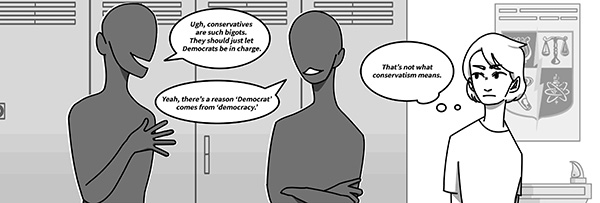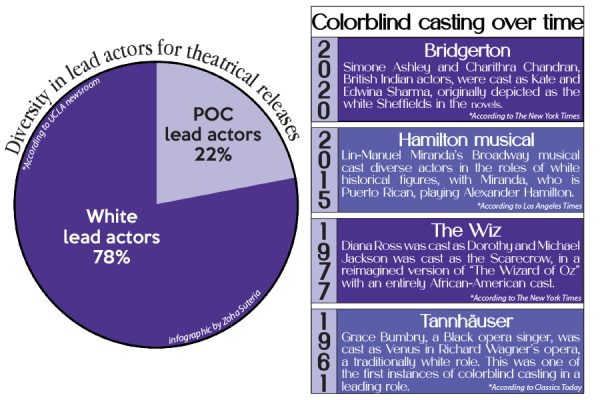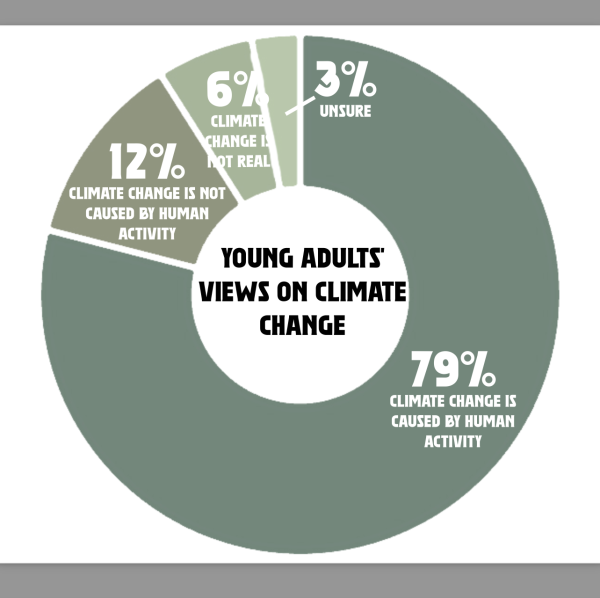Conservatism proves misrepresented in our society

illustration by Aubrey Palaganas
December 20, 2019
“Ugh, conservatives are so bigoted. They should just let Democrats be in charge.”
“Yeah, there’s a reason ‘Democrat’ comes from ‘democracy.’”
Every time I hear comments like these in the hallways of South, I have to bite my tongue. Pick your battles, girl, I tell myself. This isn’t one you want to fight. And I’m right: if I started a cool-headed debate with everyone who thinks conservatives are all aggressive chauvinists, I’d never get anything done. So I don’t try to correct everyone who says stuff like that.
On the other hand, you’ve probably seen the editorial on Page 5 of this issue. You have probably heard people call The Oracle “liberal bullshit.” In an effort to promote students’ expression, I’m writing today about my own conservative perspective in the liberal context of GBS.
Before I tell you what conservatism is, let me explain what it’s not. Being a conservative does not make me racist or sexist. It doesn’t make me hate gay people. It doesn’t mean I necessarily support all Republicans in office; they’re all different people with different ideologies that may be separate from my own. (Also, conservative doesn’t always equal Republican, just like liberal doesn’t always mean Democratic.) It doesn’t even mean I can’t support traditionally liberal efforts, like the push for accessible healthcare.
So, now that that’s out of the way, what exactly is conservatism? I divide the general conservative ideology into two sections: economic and social.
Economic conservatism deals with, shockingly, the economy of the U.S. as a whole. For example, I believe in making the U.S. a global competitor. In addition, I support lower taxes. I come from a family of seven kids, and, in Glenview, that’s financially difficult when your parents aren’t high-level executives. While, as a senior, the idea of free college is lovely, I also know that there’s no such thing as a free lunch, and that money for college has to come from somewhere. People argue that our tax money “Goes to a good cause!” and that “It benefits society!” But before it can do those things, it has to go through the government. One thing that universally defines conservatism is the want for a smaller government because conservatives believe bureaucracy tends to mess things up.
Now, what’s this social conservatism I speak of? In a word: natural laws. Okay, two words. Natural laws are basically our inalienable rights, like our right to life. I’m pretty sure most people can agree that it’s wrong to destroy innocent human life. Without getting into debates about sensitive topics, conservatives operate inside set natural laws, and we believe in freedom inside those laws.
Many municipal rules are also formed around this concept of natural rights; for example, most people don’t perform human sacrifice anymore, because it is immoral. People don’t break into houses and take whatever they want. People don’t hijack UPS trucks in Florida and get into a shootout with the police, because it’s wrong. We all know it’s wrong, but how? That’s another aspect of social conservatism: “objective rightness.” There is a definite right, there is a definite wrong, there is one truth, and there is one reality. What varies is our perception.
So, sure, own your property. Pursue happiness. Live your life. As long as it doesn’t infringe on my natural rights, I don’t care. However, I don’t want the government to tell me that I have to financially support something I morally disagree with. Sure, use my taxes to treat someone’s cancer, but I don’t want to fund, say, abortions.
And that’s where I’ve lost people. They snort in disgust and throw down the paper. They turn the page and forget they ever saw my byline. They disagree. That’s okay. What’s not okay is when those people shut my voice down. It’s not okay to disrespect a person because their beliefs differ from yours. It’s not okay to label everyone with a unique point of view a “hater,” when they may be just the opposite.
Many liberals call conservatives “haters,” because they falsely assume that we’re all sexist, racist, homophobic, or transphobic. Who’s really hating on whom?














